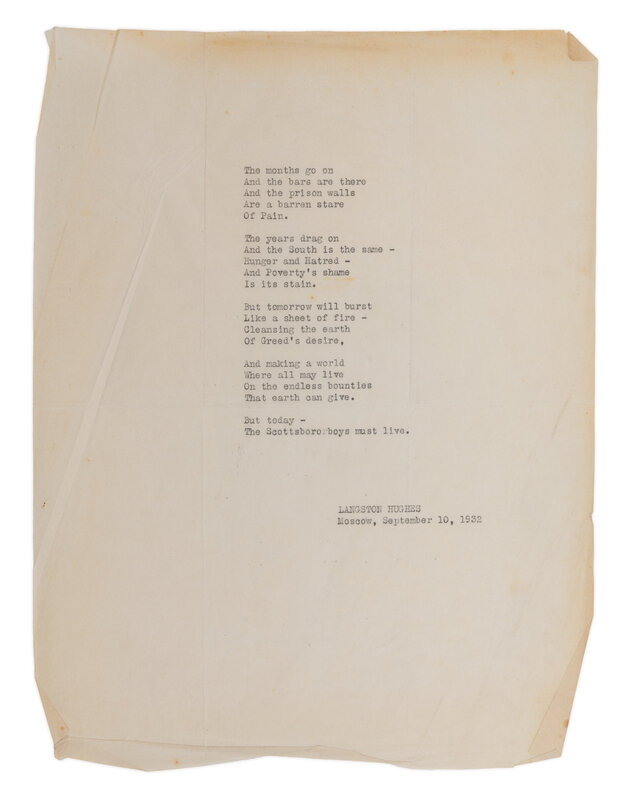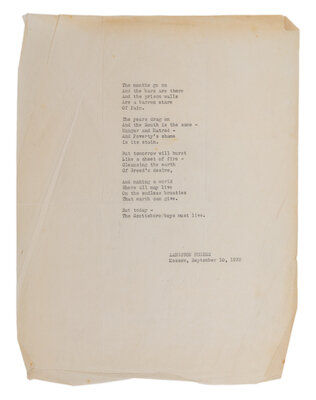Lot 218
HUGHES, Langston. Carbon copy typescript, signed in type. 1932. AN APPARENTLY UNPUBLISHED POEM BY HUGHES ABOUT THE SCOTTSBORO BOYS.
Sale 1336 - Fine Books and Manuscripts, including Worlds of Tomorrow, and Americana
Jun 7, 2024
9:00AM CT
Live / Chicago
Own a similar item?
Estimate
$800 -
1,200
Price Realized
$2,540
Sold prices are inclusive of Buyer’s Premium
Lot Description
HUGHES, Langston (1901-1967). Carbon copy typescript, signed in type ("Langston Hughes"). An apparently unpublished poem. Moscow, 10 September 1932.
1 page, 4to, 5 stanzas, comprising 20 lines, on an onion-skin sheet, creased. Provenance: Noël Sullivan (previously laid into his copy of Scottsboro Limited, see lot 217); by descent to present owner.
AN APPARENTLY UNPUBLISHED POEM BY HUGHES ABOUT THE SCOTTSBORO BOYS.
In full: "The months go on / And the bars are there / And the prison walls / Are a barren stare / Of Pain. // The years drag on / And the South is the same - / Hunger and Hatred - / And Poverty's shame / Is its stain. // But tomorrow will burst / Like a sheet of fire - / Cleansing the earth / Of Greed's desire, // And making a world / Where all may live / On the endless bounties / That earth can give. // But today - / the Scottsboro boys must live."
In June of 1932, Langston Hughes and 22 other African American artists and actors traveled to the Soviet Union to create a film, titled Black and White, about African American life in the American south. For the journey and his stay in Moscow, “Noël Sullivan had packed a hamper of marmalades, jams and teas” which Hughes shared with his fellow artists (Rampersad, The Life of Langston Hughes, Vol. I, p.245). While in Moscow, Hughes quickly learned that “Muscovites loved most foreigners, but the Scottsboro case gave American blacks an instant prestige (ibid., p.246).
By late August, the film had fallen apart, and Hughes turned his attention to his writing. His Scottsboro Limited was being translated into Russian, and “he felt the freedom of Russia at least as intensely; for the first time in his life he could live by his writing, and handsomely so” (ibid., p.252). He took on commissions for New Masses, The Negro Worker, and Izvestia. Writing to his wife, Hughes commented that he had “lost that depressing subconsciousness of being a Negro. The ever-present thought that my dark skin must circumscribe my activities at all times. I was a bit surprised how absolutely normal my moving about the Russian people has become” (ibid., p.252). Presumably, the juxtaposition between the freedom Hughes was experiencing in Russia and the imprisonment of the Scottsboro Boys compelled him to pen these lines in early September 1932. On September 22nd, some 12 days after composing this poem, he embarked on a study tour provided as part of his compensation heading south to learn about the Soviet treatment of its racial minorities in Central Asia. Writing to his Russian readers, Hughes reported, “to an American Negro living in the United States, the word South has an unpleasant sound, an overtone of horror and fear” (ibid., p.254).
Fine African Americana from the Collections of Noël Sullivan & William P. and Alice D. Mahoney
Condition Report
Contact Information
Auction Specialist

